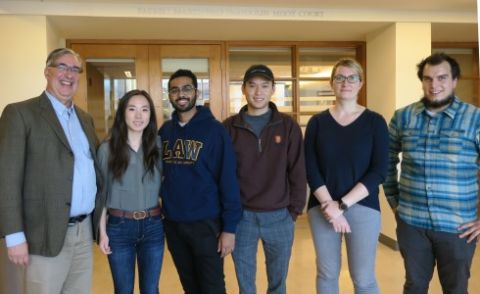
For Hisham Imtiaz, Law’19, technology law has long been a personal interest. Building on experiences and connections made through his first year at Queen’s Law, he founded the Technology Law Club in September to give fellow students opportunities to learn more about this rapidly growing area of law.
“This is a club made mostly for people trying to figure out what tech law is about and whether it can pique their interest, and connecting them with lawyers in the field,” he says. “Students will get their feet wet and get a better understanding of where their career could head.”
Last winter, as part of the school’s job-shadowing program, Imtiaz was mentored by Cory Freed, Law’02, Senior Corporate Counsel at Microsoft Canada Inc. at the company’s Mississauga headquarters. Then, over the summer, CAN-TECH Law (Canadian Technology Law Association) – a national forum for Canadian practitioners to discuss uniquely Canadian aspects of technology law and related fields of e-commerce and intellectual property – reached out to Queen’s to better integrate themselves amongst students. They called Imtiaz. “I took initiative to start the club,” he says, “and we’ve been in constant communication with CAN-TECH in planning events.”
On October 19, the club hosted its first event, “Technology and the Law,” a panel featuring Donald Johnston and Thomas Prowse, Law’85, speaking on legal work in the technology sector; issues concerning privacy, security, crypto-currency, e-commerce, and challenges moving forward for the millennial lawyer. Johnston is a partner at Aird & Berlis LLP, plying his trade in such areas as privacy and fintech (finance technology), while Prowse has worked in a multitude of settings, and is currently in-house senior legal counsel for BlackBerry QNX, the tech firm that equipped the first self-driving car street-tested in Canada.
The club is arranging for a Toronto firm-tour in January, and is casting its nets far and wide. “We have two big firms looking to partner with us, but now we are in the midst of collecting information about mid-sized firms and sole practitioners to give students a better understanding of what the legal field looks like on a whole,” says Imtiaz. He’s also planning a similar venture in Ottawa because numerous students are interested in intellectual property and “Ottawa is the IP hub of Canada.”
With technology’s current ubiquity, it is predictable that aspiring lawyers will increasingly have to tackle the rapidly evolving field and the ways in which the digital world obfuscates traditional legal rules and customs. Issues such as online anonymity and information-overload will likely challenge future lawyers for the years ahead.
“Statutory law may not be an effective means to address the issues,” says Imtiaz, “because technology changes at a way faster rate than any bill could be passed.”
At present, Imtiaz is unsure as to whether technology law is yet a subject in and of itself, or whether it represents a series of addendums to established rules. “Hopefully some of the experts at the firm-tour will be able to address that, but I think it will probably require updating old ideas.”
Check out the Queen’s Technology Law Club blog, where students share their own takes on various issues and topics related to tech law. Queen’ Law students, both club and non-club members, can make submissions to queenstechlawclub@gmail.com.
— Aschille Clarke-Mendes